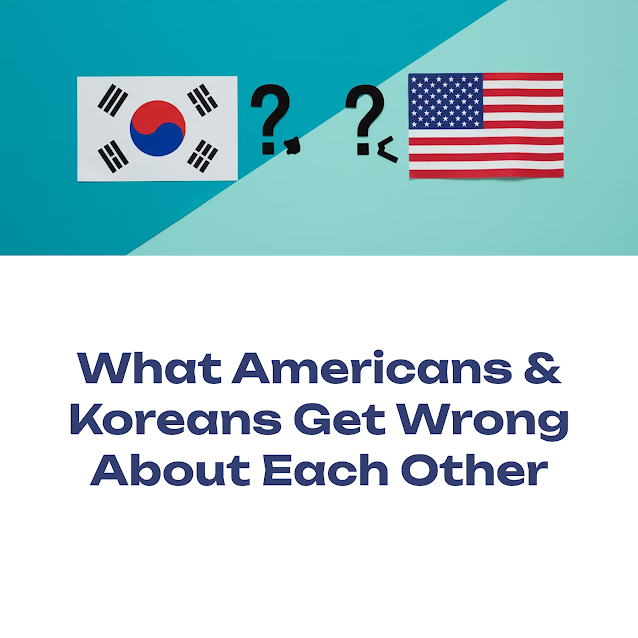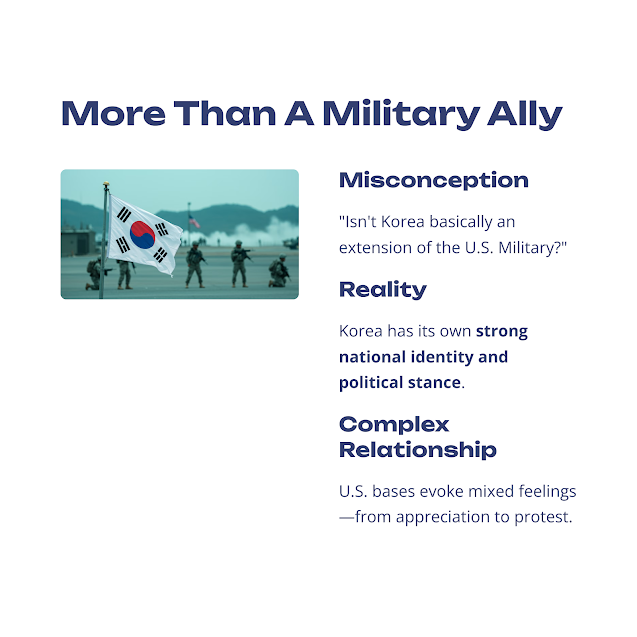Bridging the cultural gap with honest insights from a Korean-American perspective
Are We Really That Different? Unpacking Misconceptions Between Two Worlds
As a Korean-American veteran now living in Korea, I’ve seen both sides—how Americans misunderstand Korean life, and how Koreans often misread American behavior. These cultural misalignments can cause confusion, frustration, or even accidental offense. This post breaks down the most common assumptions on both sides and offers a clearer lens for anyone caught between these two identities.
What Americans Often Get Wrong About Korea
"Korea is just like Japan or China, right?"
This is one of the most common misconceptions. While Korea shares certain regional traits, it has a distinct language, history, and cultural identity. Equating all East Asian cultures not only erases important differences—it also undermines national pride.
Another common error: assuming Korea is still poor or overly traditional. Modern Korea is hyper-connected, technologically advanced, and fashion-forward, especially in cities like Seoul and Busan.
"Koreans Are All About K-pop and Kimchi"
There’s much more to Korean identity than music and food
While K-pop and Korean cuisine are important cultural exports, Korea's depth lies in its Confucian social structure, education system, and collective mindset.
Many Americans are surprised by how much hierarchy and respect for age influence daily life—from the way people speak to how they sit at a dinner table.
"Isn’t Korea Basically an Extension of the U.S. Military?"
Not quite—there’s mutual dependence, but also tension
Some Americans think Korea is fully aligned with U.S. interests because of the military alliance. But Korea has its own strong national identity and political stance, which doesn’t always align with Washington.
Important note: U.S. bases play a big role in Korean society, but locals often view them with mixed feelings—ranging from appreciation to protest.
What Koreans Often Get Wrong About Americans
"All Americans Are Rich, Loud, and Informal"
Media plays a huge role in shaping these stereotypes
Many Koreans see American culture through Hollywood, which often exaggerates wealth, friendliness, and individualism. In reality, Americans come from vastly different economic and social backgrounds, and not all are extroverted or casual.
Also, being direct in conversation doesn’t mean being rude—it’s often about efficiency and clarity.
"Americans Don’t Respect Elders or Traditions"
The value systems are different—not absent
While Korean culture emphasizes formality, especially toward elders, American respect is shown more through actions than titles. A young person might call their older boss by first name, but still show deep loyalty and support.
Koreans might interpret this as disrespect, when it’s just a difference in expression.
"American Life Is All Freedom and No Stress"
The grass isn’t always greener
Many Koreans romanticize U.S. life as free, fair, and financially easy. But from student loans to healthcare costs, Americans face different pressures.
Work-life balance is not a given in the U.S., and stress is real—just in different forms than in Korea’s exam-driven or job-secure culture.
Bridging the Gap: Lessons From Someone Who Lives Both Worlds
As a Korean-American, I’ve learned that neither culture is better—just different. The challenge is navigating both without losing yourself.
| Misunderstanding | Reality |
|---|---|
| Americans are rude | Often just more direct or individualistic |
| Koreans are cold | Social warmth grows with time and trust |
| U.S. is all opportunity | Success depends on systems and privilege |
The key to connection is curiosity. Ask, listen, and don’t assume.
Final Insight: Cultural Intelligence Matters More Than Ever
In a world that’s more connected than ever, cultural misunderstandings still cause major friction. Whether you’re an expat, student, or service member, learning how others view you—and how you view them—is essential.
Main takeaway: The goal isn’t to “correct” the other side. It’s to see each other clearly, with nuance, respect, and empathy.










